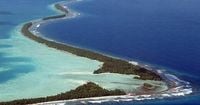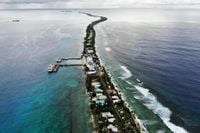Tuvalu, a tiny island nation in the Pacific, is facing an unprecedented crisis as rising sea levels threaten to submerge much of its land within the next few decades. With an average elevation of less than three meters above sea level, this Polynesian archipelago is often called the "fastest disappearing island". Scientists predict that by 2050, a significant portion of Tuvalu’s land and infrastructure will be below the high tide line, and by 2100, sea levels could rise by as much as 72 centimeters, causing flooding for nearly a third of every year.
In response to this looming threat, Australia has taken a groundbreaking step. In late 2023, the two countries signed the Australia-Tuvalu Falepili Union Treaty, which includes the world’s first planned climate migration program. Under this agreement, Australia will grant 280 visas annually to Tuvaluan citizens through a lottery system, offering a lifeline to those seeking refuge from the encroaching ocean. The first lottery opened on June 16, 2025, and within days, over 3,000 Tuvaluans—almost a third of the nation’s population—entered the ballot, reflecting the urgency of their situation.
The visa program provides successful applicants with permanent residency in Australia, along with immediate access to education, Medicare, the National Disability Insurance Scheme, family tax benefits, childcare subsidies, and youth allowances. This comprehensive package aims to offer not just safety but also dignity and opportunity to those displaced by climate change. As Stephen Howes, a researcher at the Australian National University, explained, the visa is "remarkably liberal," granting full access to Australian social security benefits without discrimination based on age, health, or disability.
Tuvalu’s capital, Funafuti, is home to 60% of the country’s roughly 11,000 residents and has already experienced a sea-level rise of about 14 centimeters over the past 30 years—approximately 1.5 times the global average. Scientists warn that by 2050, half of Funafuti’s area could be submerged by daily tides. The rising saltwater has contaminated freshwater aquifers and farmland, forcing residents to adapt by raising crops off the ground and relying heavily on rainwater collection. This has increased vulnerability to droughts, water shortages, and disease outbreaks.
Despite these challenges, Tuvalu has not remained passive. The government launched the Tuvalu Coastal Adaptation Project (TCAP) in 2017, with support from Australia and New Zealand, to fortify shorelines, reclaim land, and improve coastal hazard monitoring. Minister for Home Affairs, Climate Change, and Environment, Dr. Maina Vakafua Talia, emphasized that the project "can provide valuable lessons for other atoll nations worldwide dealing with the adverse impacts of climate change." However, as the sea continues to rise, the government is also preserving Tuvalu’s legacy by creating a digital copy of the country to archive its history, culture, and governmental functions.
The stakes extend beyond environmental concerns. The Falepili Union Treaty includes security provisions requiring Australia and Tuvalu to mutually agree on defense matters, effectively giving Australia privileged influence in the region. According to Howes, this arrangement is a "security-migration agreement," where Australia offers migration support in exchange for security cooperation. This has raised questions about Tuvalu’s sovereignty, especially since it remains one of the few countries maintaining formal diplomatic relations with Taipei rather than Beijing, amid growing geopolitical tensions in the Pacific.
Tuvalu’s Prime Minister, Feleti Teo, highlighted the treaty’s significance, stating it marks the first time a country has legally committed to recognizing Tuvalu’s future statehood and sovereignty despite the detrimental impacts of climate-induced sea level rise. Additionally, Australia has pledged to assist Tuvalu in the event of natural disasters, health pandemics, or military aggression, offering a rare formal security guarantee to a small island nation.
While the migration program offers hope, it also presents complex challenges. University of Sydney geographer John Connell warned that a long-term exodus of skilled professionals and young talent could imperil Tuvalu’s future, as its economy relies heavily on subsistence farming, fishing, and foreign aid. The departure of a significant portion of the population might weaken the country’s ability to sustain itself culturally and economically.
Tuvaluan doctoral student Bateteba Aselu, who is currently studying in Australia, expressed the emotional toll of this crisis. She described how the infiltration of seawater into freshwater aquifers is already forcing changes in agriculture and daily life. Reflecting on the potential loss of homeland, she asked, "If you have a place where you grew up and something happened and you had to move, how would you feel? Would you feel lost? Yes. Because you grew up in that place. It’s where your history is. It’s where your families are from, and it’s a place you identify with regardless of where you are in the world." This poignant question underscores the deep identity struggles that climate migration entails.
Experts like Jane McAdam and Wesley Morgan from the University of New South Wales see the migration scheme as a positive and necessary step. McAdam noted that visa holders can return to Tuvalu as often as they like or live there until conditions become too dire, likening the program to "an oxygen mask on an airplane"—something to be grateful for, even if never needed. Morgan suggested that this pioneering model could be extended to other vulnerable nations, such as Kiribati, offering a template for climate migration worldwide.
Tuvalu’s plight is a harbinger for other island nations. The Maldives, for example, faces a similar threat, with scientists warning that up to 80% of its land could become uninhabitable by 2050. Its capital, Male, has even begun constructing a floating city to adapt to rising seas. Meanwhile, countries like the Netherlands, despite being well-equipped with flood defenses and substantial household wealth, are also grappling with rising sea levels, which are increasing at more than twice the rate of the 20th century.
As Tuvaluans await the results of the visa lottery by the end of July 2025, and the first migrants prepare to arrive in Australia by year’s end, the world watches a small nation’s courageous response to a global crisis. Tuvalu may be the first country to disappear beneath the waves, but it is unlikely to be the last. Its story raises urgent questions about climate justice, sovereignty, and the future of millions who may soon face the heartbreaking choice between staying and losing their homes or leaving and rebuilding their lives elsewhere.


